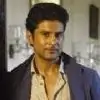the domains of Prithiviraj Chouhan. A clash was inevitable
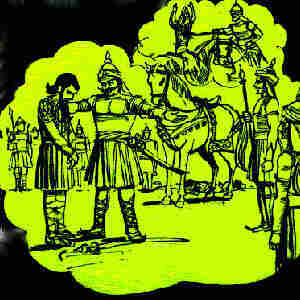 The 1st Battle of Tarain 1191 C.E. - Victory of Prithiviraj Chouhan
The 1st Battle of Tarain 1191 C.E. - Victory of Prithiviraj ChouhanMahmud Ghori threw the gauntlet by laying siege to the fortress of Bhatinda in East Punjab which was on the frontier of Prithiviraj's domains. Prithviraj's appeal for help from his father-in-law was scornfully rejected by the haughty Jaichandra. But undaunted Prithviraj marched on to Bhatinda and met his enemy at a place called Tarain (also called Taraori) near the ancient town of Thanesar. In face of the persistent Rajput attacks, the battle was won as the Muslim army broke ranks and fled leaving their general Mahmud Ghori as a prisoner in Pritiviraj's hands.
Mahmud Ghori was brought in chains to Pithoragarh - Prithviraj's capital and he begged his victor for mercy and release. Prithviraj's ministers advised against pardoning the aggressor. But the chivalrous and valiant Prithviraj thought otherwise and respectfully released the vanquished Ghori.
The 2nd Battle of Tarain 1192 C.E. - Defeat of Prithiviraj ChouhanThe very next year Prithiviraj's gesture was repaid by Ghori who re-attacked Prithiviraj with a stronger army and guilfully defeated him by attacking the Rajput army before daybreak. (The Hindus incidentally followed a hoary practice of battling only from sunrise up to sunset. Before Sunrise and after Sunset there was to be no fighting- as per a time honoured battle code).The defeated Prithiviraj was pursued up to his capital and in chains he was taken as a captive to Ghor in Afghanistan.
The Blinding of PrithvirajThe story of Prithiviraj does not end here. As a prisoner in Ghor he was presented before Mahmud, where he looked Ghori straight into the eye
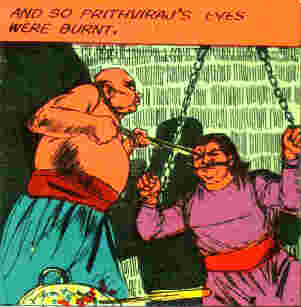
Ghori ordered him to lower his eyes, whereupon a defiant Prithiviraj scornfully told him how he had treated Ghori as a prisoner and said that the eyelids of a Rajputs eyes are lowered only in death.On hearing this, Ghori flew into a rage and ordered that Prithviraj's eyes be burnt with red hot iron rods
This heinous deed being done, Prithiviraj was regularly brought to the court to be taunted by Ghori and his courtiers. In those days Prithiviraj was joined by his former biographer Chand Bardai, who had composed a ballad-biography on Pritiviraj in the name of Prithviraj Raso (Songs of Prithviraj). Chand Bardai told Prithiviraj, that he should avenge Ghori's betrayal and daily insults.
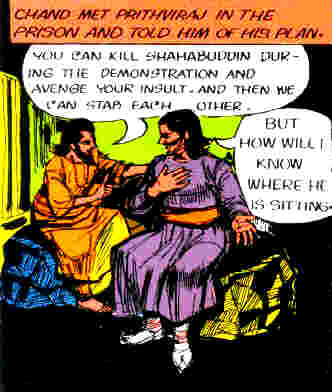
The Blind Prithviraj Avenges the Injustice done to him
The two got an opportunity when Ghori announced a game of Archery. On the advice of Chand Bardai, Prithviraj, who was then at court said he would also like to participate. On hearing his suggestion, the courtiers guffawed at him and he was taunted by Ghori as to how he could participate when he could not see. Whereupon, Prithiviraj told Mahmud Ghori to order him to shoot, and he would reach his target.
Ghori became suspicious and asked Prithviraj why he wanted Ghori himself to order and not anyone else. On behlaf of Prithiviraj, Chand Bardai told Ghori that he as a king would not accept orders from anyone other than a king. His ego satisfied, Mahmud Ghori agreed.
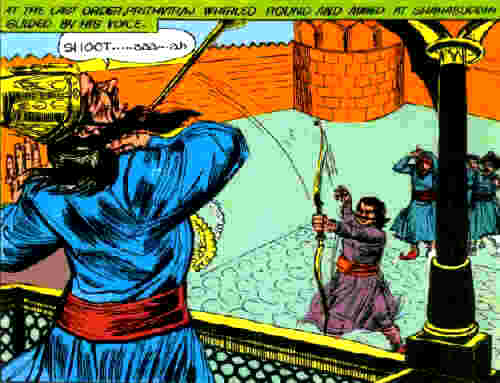
On the said day, Ghori sitting in his royal enclosure had Prithiviraj brought to the ground and had him unchained for the event. On Ghori's ordering Prithviraj to shoot, we are told Prithiviraj turned in the direction from where he heard Ghori speak and struck Ghori dead with his arrow. This event is described by Chand Bardai in the couplet,
"Dus kadam aggey, bees kadam daey, baitha hai Sultan. Ab mat chuko Chouhan, chala do apna baan." (Ten feet ahead of you and twenty feet to your right, is seated the Sultan, do not now miss him Chouhan, release your baan - arrow).
Thus ended the story of the brave but unrealistic Prithviraj Chouhan - the last Hindu ruler of Delhi. Delhi was to remain under Muslim rule for the next 700 years till 1857 and under British rule till 1947. Those few Hindus who came close to liberating Delhi during the seven centuries of Muslim rule were Rana Sanga in 1527, Raja (Hemu) Vikramaditya in around 1565 (2nd battle of Panipat), and Shrimant Vishwas Rao who was the Peshwa's son and was co-commander of the Maratha forces in the 3rd battle of Panipat in 1761. Metaphorically speaking, the next Hindu ruler to actually preside over Delhi was to be Dr. Rajendra Prasad, the first President of Independent India (and Jawarharlal Nehru - who was the President's first Minister).




